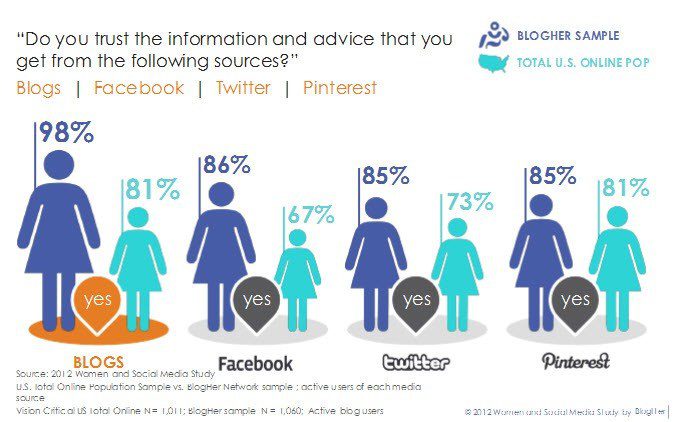USA Today recently wrote up an article about the end of corporate blogging. Refering to a study done by U Mass (Dartmouth) done ![]() earlier this year, it said that “…the percentage of companies that maintain blogs fell to 37% in 2011 from 50% in 2010, based on its survey of 500 fast-growing companies listed by Inc. magazine. Only 23% of Fortune500 companies maintained a blog in 2011, flat from a year ago after rising for several years.”
earlier this year, it said that “…the percentage of companies that maintain blogs fell to 37% in 2011 from 50% in 2010, based on its survey of 500 fast-growing companies listed by Inc. magazine. Only 23% of Fortune500 companies maintained a blog in 2011, flat from a year ago after rising for several years.”
The higher value of women in social media
In another article by Business2Community, I found this graphic below, which cites a survey done with 2,000 members of the Blogher community (all US), showing that blogs invite the highest degree of trust. The first point that is worth making about this particular survey is that the Blogher community is clearly a more “trusting” group when it comes to digital information and platforms. Secondly, it’s worth noting that Pinterest (75% female audience), which is equal to blogs in “trustworthiness” for the general online population in the US, gains more trust than both Facebook and Twitter. The Blogher data, of course, takes greater meaning for brands with a female audience. And, as I wrote here, women in social media are far more engaged and, according to the industry segment, have an overwhelming say in the purchasing decision.
5 reasons for a corporate or branded blog
Aside from that, however, the key point is that the level of trust gained by blogs is significantly higher than the two “easy” targets, Facebook and Twitter. I believe that blogging is, more than ever, an important tool in the digital marketing armory for brands. I have five main reasons for that:
- Trust is the single most important value in any communication strategy — and today, trust is sorely missing for customers vis-a-vis brands; but, also for the employees working within. By virtue of the greater effort, which is demonstrable, customers see the commitment in a blog.
- Blogs provide a forum for true conversation, providing you can make the content inviting and engaging. After figuring out how to attract readership, the key is to find ways to allow the customer/reader into the article. And then, be sure to answer and converse when (if?) comments come in.
- Articles — especially long form — provide an opportunity to display greater commitment to and knowledge of the topic. This is a sure way to leverage a competitive advantage.
- Google and Bing love contextually relevant words and well-tagged images.
- A blog is your own space to manage the conversation. You will not have to submit to the rules and ever-changing environment of the various social media networks.
Blog – for deeper social media engagement
Especially since brands/companies cannot find the time, resources, method and voice to write their own blog, I think that the opportunity to have a blog becomes even larger. Of course, this still means finding the writer, the resources and the editorial line & relevant content. But, I believe that every brand — all the more so in a B2B environment — has good reason to want to communicate with greater depth with its client and prospective client base. To the extent the blog can be a way to engage your own employees, as well, I truly subscribe to the blog as a viable part of the digital marketing mix. And, this is a strategic point: a blog cannot be outsourced. Moreover, the higher to the top (c-suite) the author, the more powerful the transformation may follow.
Your thoughts? Please do chime in (and show that blogging is powerful!).












I don't imagine that many outside brand attacks occur on smaller to medium sized businesses. Instead, I'd bet that most of their brand damage comes from within – rogue employees on social media, etc.